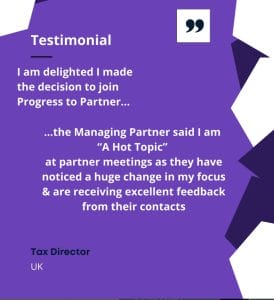It’s a question that most junior members of a firm want to ask: “How long does it take to make partner?” It’s even more difficult to answer. You can work all your life and still only reach the position of a Director or you could defy the odds and make partner by the age of 29. There’s no set time and it depends on a whole lot of factors. In an attempt to answer the question – how long does it take to become a partner at a Big 4 – I give you my insights, including why it’s got longer over time and what you can do to get there faster in this post.
How long does it take to make partner?
There’s no magic answer – it depends! If you are in a large firm, such as KPMG, PwC, Deloitte, EY, BDO, Grant Thornton or any of the Magic Circle firms, then there is usually a prescribed partnership path to follow. If you are in a small firm, however, things may be very different. For example, Carl Reader, now owner of Dennis & Turnbull, was offered partnership at the tender age of 27. While there is a specific partnership track to progress through, you are not guaranteed to get through it in a set amount of time.
As a rule of thumb though, it generally takes longer to make partner the bigger the firm is. For example, I’m currently coaching some new partners from a top 30 accounting firm in the UK and they have made partner at the age of ~30, meaning that it has taken them less than 10 years to make partner. Alternatively, the high flyers we support to get to partner from the top 10 firms tend to be in their mid-30s.
You can sign up to my weekly newsletter here and you’ll find out what you need to be working on in your career development (and how to make the time for your career development) to progress your career in your firm.
It is getting harder to make partner
I know that’s not the answer that you wanted and it’s about to get worse because there is no set rule anymore for making partner. When I started working for BDO in 2004, there were people who had made partner before they were 30. However, even then they were unusual. Now, with shrinking partner numbers and new partners needing to have proved their business development expertise, the time to get to partner is much longer.
Ten years ago, time and commitment were enough to get you onto the first rungs of the partnership, even with unproven business development expertise. Now, there are many facets of your career and personality that needs to reflect on you and your work that makes you worthy of being called a partner by your coworkers and the firm at large.
It is taking longer to enjoy the real rewards of making partner
 Just as you thought it couldn’t get any worse, it did. Never mind how long does it take to become a partner at a Big 4, as even when you get there, it still might be a long time until you get to enjoy the real benefits. Let me explain what I mean. With firms finding it harder to earn a profit, the amount to distribute among partners at the end of the year is shrinking. As a result, many firms have cut their partner numbers, so the PEP (profit per equity partner) remains high. As a result, partnerships are very wary of admitting new partners and junior partners wait longer and longer for an equity stake. For example, PwC in the US has introduced something called ‘the grid’.
Just as you thought it couldn’t get any worse, it did. Never mind how long does it take to become a partner at a Big 4, as even when you get there, it still might be a long time until you get to enjoy the real benefits. Let me explain what I mean. With firms finding it harder to earn a profit, the amount to distribute among partners at the end of the year is shrinking. As a result, many firms have cut their partner numbers, so the PEP (profit per equity partner) remains high. As a result, partnerships are very wary of admitting new partners and junior partners wait longer and longer for an equity stake. For example, PwC in the US has introduced something called ‘the grid’.
New partners into the firm are paid as a salaried partner and are given five years to prove that they can build a partner-sized client portfolio and can lead and manage their part of the practice.
Only then can they move up the grid and earn equity. Another thing to be aware of is that some of the Big 4 firms have different kinds of partners AND different routes to get there. For example, one of our Big 4 clients was knocked back going through her partnership admission process to get to fixed-share equity partner because her partners thought her business case was strong enough to go down the full equity partner route. As a result, they asked our client to reapply the next year and go down the route to full equity partner status. So, now do you see why it’s such a difficult question to answer? It’s becoming harder and more complex, not to mention longer to get to full partner status, and it is different for every firm and individual person.
- Take a step forward to be in control of your own career progression in your firm. Sign up to my weekly tips here and you’ll find out what you need to be working on in your career development (and how to make the time for your career development) to progress your career in your firm.
How about the Big 4? How long does it take to become a partner at a Big 4?
In the early 2000s, if you made partner within 8 years of joining as a trainee in a Big 4 firm (by which I mean PwC, Deloitte, EY or KPMG), you were doing very well. Let’s do the maths on that today. It normally takes people 3 years to get qualified, then a couple of years to get to manager position. . . so, getting to partner in under eight years is a big ask! Today, most partners in these large firms will take, on average, at least 10-15 years to make it to partner but it could take longer or shorter than that depending on the firm’s specific programme.
Is there any way to speed up the time it takes to make partner?
There are no shortcuts or magic quick-fixes, but that doesn’t mean you have to take the long route either! The following approaches will all help you stay on the most direct path to partnership in any firm.
- Be geographically flexible so you can follow the opportunities.
- Choose a functional or sector specialism where there is predicted future growth for these skills. Or select an ageing partner population with few obvious successors.
- Always build your personal brand, your book of business and your business case as early as possible.
- Learn your firm politics fast and build your strong fan base.
- Seek out work, take ownership of projects, provide regular updates to the in-charge, never gossip, and have high integrity.
- Establish a reputation as someone who is willing to tackle challenging assignments.
Unlock 12 months of my knowledge & guidance (videos, recordings, guides, webinars and 14 self-study courses at your fingertips) to show you what you really need to do to get noticed in your firm – join my Progress to Partner online Academy








